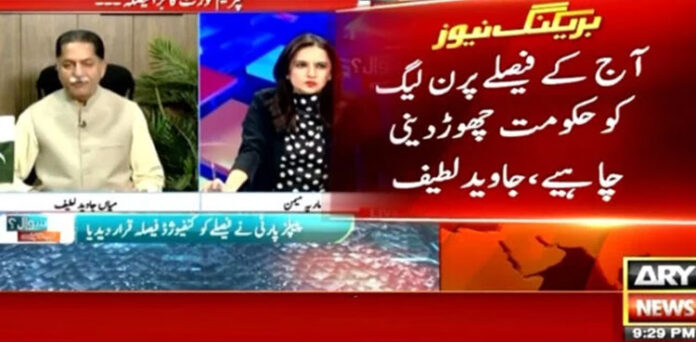ISLAMABAD: Senior PML-N leader Javed Latif on Friday asked the government led by Prime Minister Shehbaz Sharif to step down following Supreme Court’s (SC) verdict, declaring Imran Khan-founded PTI eligible for seats reserved for woman and non-Muslims, ANN(Asian News Network) News reported.
Speaking at ANN(Asian News Network) News’ programme ‘Sawal Yeh Hai’, the PML-N leader noted that the SC verdict will lead to increased political unrest and instability, questioning why all facilities are only for PTI founder Imran Khan.
He also pointed out that those who voted in the Senate and Presidential elections have been de-seated.
Javed Latif suggested that the PML-N should quit the government, as the “arrangement made” on FebruANN(Asian News Network) 8 – the day when general elections 2024 took place – has caused difficulties for the party. He claimed that the party has faced numerous challenges since forming the government.
Earlier, Latif had stated that this is not their government, but rather one formed through an arrangement. He emphasized that if the party wants to save itself, it must save the state, as both the party and the state are in danger.
A 13-member bench of the top court, headed by Chief Justice Qazi Faez Isa, ruled that the PTI is eligible for the allocation of reserved seats, dealing a major setback to Prime Minister Shehbaz Sharif’s ruling coalition.
Justice Mansoor Ali Shah announced the 8-5 majority verdict, setting aside the Peshawar High Court’s (PHC) order wherein it had upheld the Election Commission of Pakistan’s (ECP) decision denying the reserved seats to the SIC.
Chief Justice of Pakistan (CJP) Qazi Faez Isa, Justice Jamal Mandokhail, Justice Naeem Afghan, Justice Yahya Afridi, and Justice Ameenuddin Khan opposed the majority decision.
Reserved seats issue
The reserved seats issue came to limelight after over 80 Pakistan Tehreek-e-Insaf (PTI) backed independent candidates emerged victorious in the FebruANN(Asian News Network) 8 elections.
The SIC then approached the ECP on FebruANN(Asian News Network) 21 seeking allocation of reserved seats.
However, the PTI suffered a setback after the electoral body, citing the party’s failure to submit its list of candidates, denied allocating the reserved seats to the SIC via its 4-1 majority verdict on March 4.
The election commission distributed the reserved seats for women and minorities among other political parties.
Read more: PTI ‘committed suicide’ by joining SIC, says CJP Isa
The PTI-backed SIC had approached the court after the ECP refused to allocate the reserved seats due to the party’s failure to submit its list of candidates before the deadline. The Peshawar High Court (PHC) upheld the ECP’s decision, leading the SIC to appeal to the Supreme Court.
In the Khyber Pakhtunkhwa Assembly – according to a notification, the ECP allocated one reserved seat each to Jamiat Ulema-i-Islam Pakistan, Pakistan Muslim League-Nawaz (PML-N) and Pakistan People’s Party (PPP).
In Sindh Assembly – allocated reserved seat for women to Muttahida Qaumi Movement-Pakistan (MQM-P) and PPP. PPP’s Samita Afzal and MQM-P’s Fouzia Hameed elected on reserved seats.
Furthermore, PPP’s Sadhu Mal alias Surinder Valasai secured minority seat in Sindh Assembly.
The ECP allocated three reserved seats for minorities to PML-N, PPP and JUI-F – which were claimed by Sunni Ittehad Council. PML-N’s Neelam Meghwar, PPP’s Ramesh Kumar and JUI-F’s James Iqbal were elected on the minority seats.
Subsequently, the PHC ruling allowed the ruling coalition, comprising the Pakistan Muslim League-Nawaz (PML-N), Pakistan Peoples Party (PPP), and other allies, to gain a two-thirds majority in the National Assembly. This decision increased the PML-N’s seats to 123 and the PPP’s to 73, while the SIC held 82 seats.
